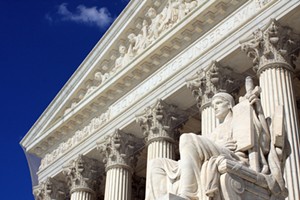AAN was one of thirteen media organizations and companies who joined an amicus brief filed in two cases that have been combined by the Supreme Court because they share a common issue. Those cases are:
- David Leon Riley was arrested after a routine traffic stop revealed firearms under the hood of his car. His smartphone was seized and searched without a warrant. During the search, the arresting officer saw initials in Riley’s contact list that suggested a gang affiliation. A second warrantless search at the police station found pictures and videos which further suggested gang affiliation. Riley was charged with several offenses, including allegations that the crimes were gang-related. He moved to suppress this evidence on the grounds that it violated the Fourth Amendment. The lower court denied the motion to suppress the evidence, ruling that it was incident to Riley’s arrest. He was eventually sentenced to 15 years to life.
- In Brima Wurie’s case, police officers saw him making a drug sale that appeared to have been arranged by mobile phone. He was arrested and taken to the police station where two of his mobile phones (among other personal property) were seized. Looking at the call log, officers noticed Wurie had received number of calls from a location near where he was arrested. Officers obtained a warrant to search that house, where they found drug paraphernalia, cash, a firearm and ammunition, as well as encountering a woman who strongly resembled a woman found in a picture on his phone. Several charges were brought against Wurie who also moved to suppress this evidence. The motion was denied and he was sentenced to thirty years in jail.
Two appellate courts ruled differently when reviewing theses cases. Riley’s conviction was upheld by the California Court of Appeals, who held that the mobile phone, being on Riley’s person when he was arrested, was “incident to his arrest” and searchable even though no exigent circumstances (such as possible destruction of evidence) existed. The California Supreme Court denied to review the case. Wurie’s conviction was thrown out by the United States Court of Appeals for the First Circuit. That Court held that the “incident to arrest” exception to the search warrant requirement requires that one of two conditions be present: (1) a need to promote officer safety or (2) a need to prevent the destruction of evidence.
Our amicus brief was filed on April 3. It generally argues that these searches violate three constitutional rights: the 4th Amendment right to be free of warrantless search and seizure, the 5th Amendment right against self-incrimination and, of course, the 1st Amendment right to free expression.
Given that so many reporters are stopped on the streets (often for pre-textual reasons rather than commission of or connection with actual crimes), we felt it was important to ensure that their phones and other devices cannot be indiscriminately searched by law enforcement seeking a way around various protections important to the newsgathering process (including but not limited to various state shield laws, judicially-created reporter’s privileges and the federal Privacy Protection Act).
The first section explains how smartphones have become integral to modern reporting. Whether taking photos, videos, recording voice or other audio or simply taking notes, these phones allow reporters in the field to do so much more than they used to. They also allow those stories to be published immediately. But with reporters carrying all that information with them in one place, the threat to free expression is heightened should the reporter be arrested and his or her phone searched. And, sadly, reporters are being arrested for taking photos and videos – even in public places – more often than ever before. While the charges are often dismissed – or perhaps because they are often dismissed – one wonders whether arrests for “disturbing the peace” or similar charges are simply a pretext to search the reporter’s device and/or delete images or recordings. The brief gives numerous examples of reporters and “citizen journalists” alike being arrested for filming public events in public places.
Though smart phones could not have been envisioned by the Founding Fathers, new technology has received Fourth Amendment protection in the past. The next section of the brief reviews several of these cases. It then concluded that, because smart phones carry the same kind of highly personal information the Framers of the Constitution sought to protect, they should receive this protection as well.
The brief then emphasizes the connection between these three constitutional rights of freedom from warrantless search and seizure, freedom from self-incrimination and freedom of expression. It looks at several cases, including those involving the search and seizure of books and films, to argue that part of the reason for a strong 4th Amendment protection in these cases is to prevent even minimal infringement on 1st Amendment rights.
The final portion of the brief involves our ask, that the Court make clear that any search or seizure of a mobile phone requires a warrant:
“Although the defendants in the cases below were not journalists, the issues raised by the warrantless searches of their phones incident to their arrests are of special concern to members of the press and others who use such portable electronic devices to record public events and to store private thoughts. Amici urge this Court to hold that a warrant must be obtained for the search of a cell phone incident to arrest because of the inherent interconnected nature of rights protected by the Fourth, First, and Fifth Amendments.”
The cases are set for oral argument on Tuesday, April 29. The Court is most likely to issue its opinion in June.
Please feel free to contact AAN Legal Counsel Kevin M. Goldberg at 703-812-0462 or goldberg[at]fhhlaw.com if you have questions about this brief or any of AAN’s legal affairs.

